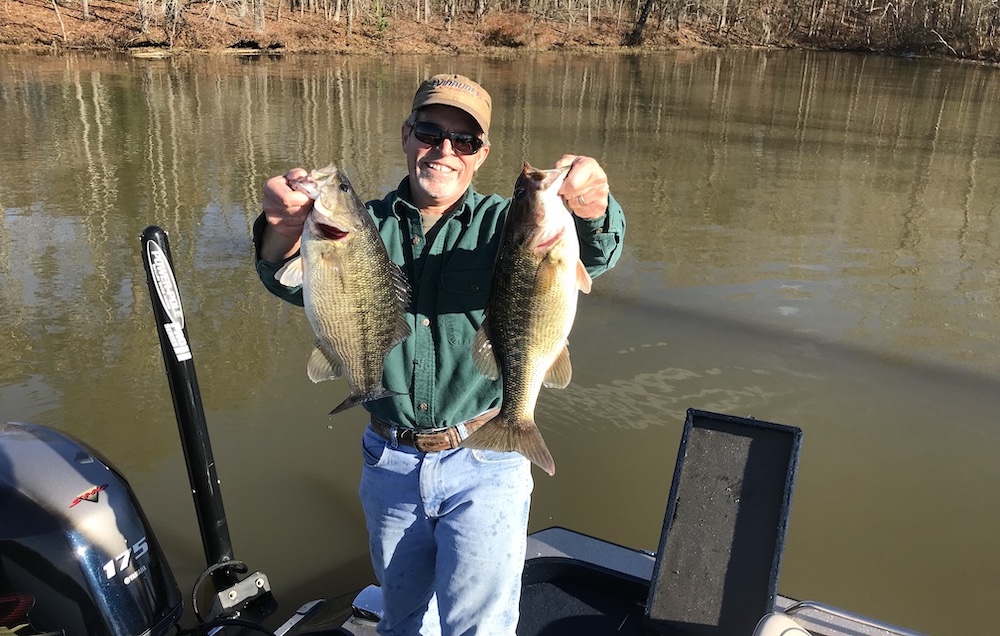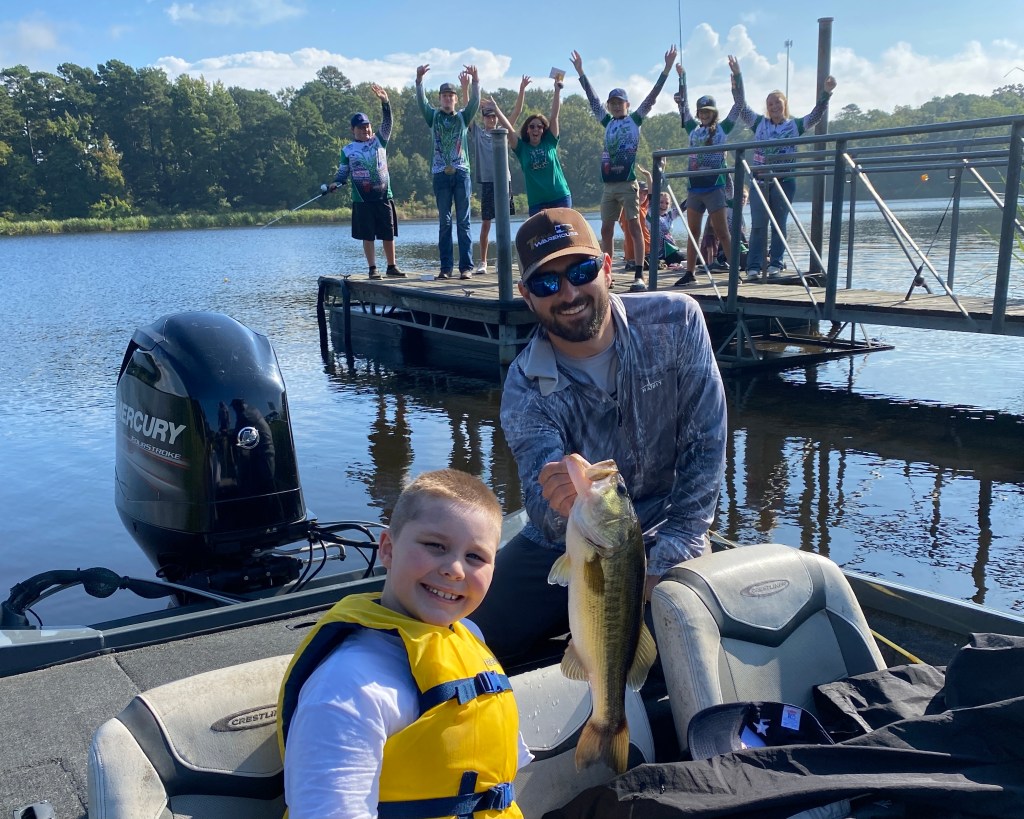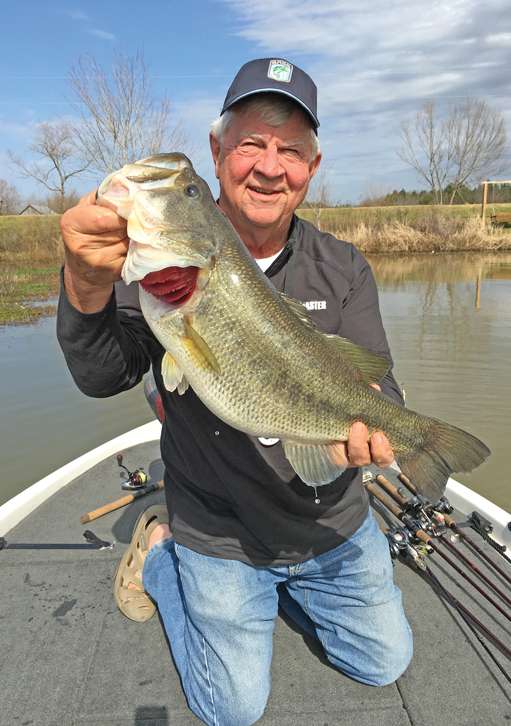
If you want to live a longer, healthier, happier life, try “bass bathing.”
No, we’re not talking about swimming with the fishes. “Bass bathing” is Bassmaster’s version of shinrin-yoku, the Japanese practice of forest bathing, or immersion in a tree-filled outdoors.
First given a name in the 1980s in Japan, forest bathing is simply spending time in the woods, clearing your mind and letting the sights, sounds, smells and other sensations of a forest wash over you. Think mindfulness among the leaves. It’s been proved to lower your blood pressure and reduce stress, and it’s even being prescribed to treat mental health issues on both sides of the Pacific Ocean.
So, if tree hugging is so good for you, just imagine what catching, kissing and releasing a largemouth can do for mind, body and spirit.
In fact, just being around water can be even more beneficial than forest bathing alone. Dr. Wallace J. Nichols, a marine biologist and author of the best-seller, Blue Mind: The Surprising Science That Shows How Being Near, In, On, or Under Water Can Make You Happier, Healthier, More Connected, and Better at What You Do, says that proximity to water — as in bass fishing — can provide a long list of benefits for our mind and body.
“Aquatic therapists are increasingly looking to the water to help treat and manage PTSD, addiction, anxiety disorders, autism and more,” he said in an interview in USA Today. His own research has shown that “being near water boosts creativity, can enhance the quality of conversations and provides a backdrop to important parts of living — like play, romance and grieving.”
Through exhaustive research — much of it taking place on the water — we’ve identified the following list of 20 reasons bass fishing is good for you. This list is not complete, but it should be enough to help you rationalize taking off from work, postponing yardwork or putting off paying bills in order to go fishing.

- Fishing promotes mental health. A study by the National Institute for Health Research in London found that people who live in urban environments are at a higher risk of numerous mental health issues, including depression, anxiety, psychosis and addictive disorders. However, spending time in nature was shown to provide long-lasting protection against developing those conditions.
- Fishing offers healing benefits. It is well-established that fishing and other outdoor activities help veterans cope with post-traumatic stress disorders (PTSD). The organization Hope for the Warriors incorporates fishing into its programs because it provides therapeutic benefits to help service members on the road to recovery. Others, including Heroes on the Water and Project Healing Waters Fly Fishing are directly focused on using fishing to promote physical and emotional rehabilitation of veterans suffering from PTSD and other disabling conditions
- Fishing puts smiles on faces, especially of special needs children. Jay Yelas, a Bassmaster Elite Series angler and former Bassmaster Classic champion, also serves as executive director of C.A.S.T. for Kids Foundation, a nationwide organization that ministers to special needs children and their families. “What we have found about these kids is that they aren’t sure of what they can and can’t do in life,” Yelas said. But after a day of fishing, the youngsters gain confidence that they can try new activities and succeed in them.
“It’s eye-opening for them. It gives them the confidence to try things they didn’t think they could do,” he added. “They feel loved and valued.” What’s more, seeing these kids catch fish helps parents better understand what their children can accomplish if given an opportunity.
- Fishing builds self-esteem. Whether or not a person has physical or mental challenges, learning new skills and applying them to catch fish increases self-confidence, Yelas and other agree. Catching fish, especially big bass, makes anglers feel good about themselves and compels them to tell their friends all about it. Oddly enough, the reverse is not often true. Unless they lose the bass that would have won a tournament, fishermen don’t beat themselves up about it — it’s too easy to blame failure on the weather, your tackle or that kid over there on a jet ski.
- Fishing relieves stress. Dr. Neil Schaffner is an avid bass fisherman as well as an internal medicine specialist with the East Alabama Medical Center in Opelika, Ala., and he well understands the science behind the therapeutic effects of fishing. He also has observed its impact first-hand.
“My father was an ophthalmologist who worked incredibly long and hard hours in the late 1950s and 60s before dying in 1973. The only time I can ever remember him being relaxed was when we were out together, fishing on a river or pond somewhere. He became a different person when he would “get away from it all.” I truly believe that if he would have spent more time on the water and less in an operating room, he would have lived longer.”
- Fishing is good for the heart. An endocrinologist, Schaffner cites multiple studies proving that levels of cortisol – our “stress hormone” — in the blood decrease during a day of fishing. “This results in lower blood pressure, lower blood sugar, lower cholesterol levels and better cardiovascular outcomes,” he explained.
- Fishing clears the cobwebs and counteracts noise pollution. Just getting on the water and away from “noise pollution” televisions, traffic and loud workplaces has benefits because it helps you clear your mind. According to a study detailed in BioScience Journal, daily exposure to nature not only reduces stress and improves self-esteem for long periods, it also helps a person “become more mindful and present in the moment.”
- Fishing improves analytical skills and sharpens the mind. Bass fishing, especially, requires a lot of concentration, so the mind gets a workout as much as the body. “I’m 64 years old, and for us aging folks, anything we can do to keep our minds sharp is worthwhile,” said Schaffner.
- Fishing helps young people develop fine motor skills. Learning to cast and set a hook and tie knots is a great tool for developing motor skills in children. Schaffner coaches high school anglers and loves seeing them progress from fumbling adolescents to accomplished fishermen with broad skill sets for tournament competitions. One of the young anglers he coached and mentored, Logan Parks of Auburn, Ala., recently won — along with his teammate Tucker Smith of Birmingham — more than $1 million in the Bass Pro Shops U.S. Open Team Championship presented by Toyota on Table Rock Lake in November.
- Fishing connects kids with nature. “Within the space of a few decades, the way children understand and experience nature has changed radically,” laments Richard Louv, author of Last Child in the Woods: Saving Our Children From Nature-Deficit Disorder. “Today, kids are aware of the global threats to the environment — but their physical contact, their intimacy with nature, is fading.” Instead, they’re transfixed by video screens, experiencing nature only through the metaverse, if at all.
Louv mentions several studies suggesting that “thoughtful exposure of youngsters to nature can even be a powerful form of therapy for attention-deficit disorders and other maladies. As one scientist puts it, we can now assume that just as children need good nutrition and adequate sleep, they may very well need contact with nature.”
- Fishing strengthens family bonds. I spent plenty of time with my father while growing up — mostly during morning and afternoon milking sessions on our dairy farm. But it was during our fishing trips to nearby ponds and lakes that I really got to know him. Dr. James Dobson, author and founder of Focus on the Family, wrote that one-on-one time outdoors is a great opportunity for parents to pass along their principles, priorities and beliefs to their sons and daughters.
- Fishing builds friendships. “Fishing in pairs or groups enhances social engagement — real person-to-person interactions, not via some handheld device,” Schaffner added. Better social skills are important not only for youngsters but older adults, as well. There are few better ways to get to know a person than spending a day on the water with them, fishing.
- Fishing is good exercise. In addition to the mental and emotional boons of bass fishing, there are physical benefits, too. The uninitiated might think the only exercise involved is a biceps curl while lifting a beer can, but bass fishing is hard work. It’s taxing to stand on the bow of a rocking boat and dredge deep crankbaits all day, which is why Elite pros put so much effort into physical conditioning.
- Fishing protects against COVID. There’s a reason our lakes got crowded when the pandemic hit. You’re a lot less likely to contract COVID while outdoors in a bass boat than you are while sitting in a crowded restaurant or movie theater. Even when viruses aren’t a threat, the clean, cool air around a lake or stream is revitalizing to the lungs.
- Fishing increases your heart rate. A case probably could be made that bass fishing is good cardio exercise, but it’s a sure thing that your heart rate will go up when you have that personal-best bass or the tournament-winning lunker on the line.
- Fishing exposes you to more vitamin D. Absorbing UV light while being out in the sun is a great way to increase vitamin D levels. Getting enough vitamin D helps strengthen bones and prevent certain cancers. If you’re not getting enough of the essential vitamin, you may suffer from muscle weakness, fatigue and depression.
- Fishing provides a source of healthy food. This is more true of oily saltwater fish like tuna and salmon than bass, but consuming fish increases your intake of calcium, iodine and omega 3 fatty acids, which help lower risks of heart disease. Fish is an important component of a high-protein diet that is also low in cholesterol and carbohydrates, which helps reduce the risk of diabetes, said Schaffner.
- Fishing makes life last longer. Or, at least, it seems that way. Scientific research indicates that the brain’s perception of the passage of time is based on the quality or novelty of experiences. If you can remember every detail of a fishing trip two weeks ago, but not what you had for lunch yesterday, that’s proof that fishing is a “quality” experience.
According to Tim Sanders, a motivational speaker I heard at an American Sportfishing Association seminar a few years ago, “Most people have only three days they remember in the past month. Life is not in the number of days you live but the number of days you remember.” His message was that fishing makes memories, and memories make life more fulfilling.
For more on this read, “Fish More, Live Longer.”
- Fishing helps us appreciate nature. Pausing to take in a colorful sunset or a foggy morning creates in us a sense of awe, which also leads to a fuller, longer and more satisfying life. Authors of a study published in Psychological Science reported, “Awe expands people’s perception of time and enhances well-being,” and that has the effect of adjusting time perception, improving decision-making and making life feel more satisfying.
- Fishing offers a spiritual experience. Perhaps most important for some of us, being immersed in creation draws us closer to our Creator. “When you’re out on the water, you get to experience creation in a special way,” said Yelas. “The water, the trees, the wind, the sun, rain and clouds, all the wildlife you might see — it all helps you feel God’s peace and His presence. There’s just something awesome about that.”

